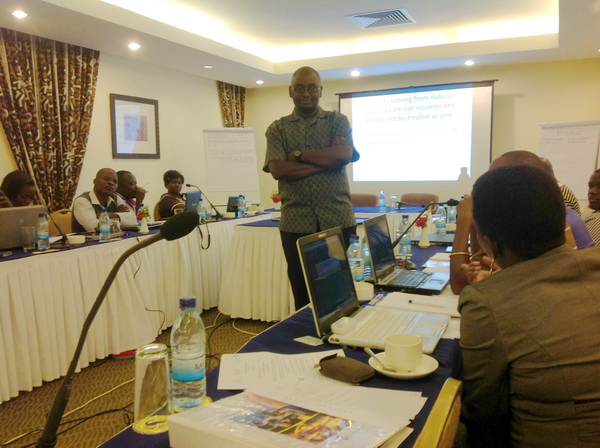 Mr Amani Mustafa Mhinda, a lawyer & executive director of HakiMadini in Tanzania, during one of the sessions.Journalists in resource-rich countries in Africa have been asked to understand slangs of the industry to enrich their reportage and to protect the interest of their countries.
Mr Amani Mustafa Mhinda, a lawyer & executive director of HakiMadini in Tanzania, during one of the sessions.Journalists in resource-rich countries in Africa have been asked to understand slangs of the industry to enrich their reportage and to protect the interest of their countries.
Various speakers at this year’s oil, gas and mining training for 30 journalists from Ghana, Uganda and Tanzania in Dar es Salaam stressed the need for editors and correspondents to be up-to-date with issues bordering on environment, social and human rights impacts of the extractive industries.
They said it was only when journalists show commitment and learn about the industry that they will be better positioned to question the operations of industry players.
The organizers, Thomson Reuters Foundation, PenPlusbytes, Africa Center for Media Excellence and Revenue Watch Institute, said the training was designed to introduce journalists to some of the critical issues on the exploitation, management, and utilization of oil, gas and mineral resources.
The Media Programme Officer of Revenue Watch, Mr. George Lugalambi, said with the emergence of hydrocarbons and other resources along the coasts and inland of African countries demands that journalists be equipped to do a good job.
The course therefore, he said “will reinforce the knowledge and skills of the journalists to stimulate and feed public debates on how best to ensure that the proceeds from these resources are used in the best interest of their respective countries citizenry.”
For his part, Mr. Nike Phythian of the Thomson Reuters Foundation took journalists through the fiscal system and how it was expected to capture all revenue that should come to the state in the form of corporate taxes, royalties, interests, bonuses and rents.
He said it was therefore very important that resource owners were made to control the income and expenditure of international oil companies who operate and exploited their natural resources to ensure that they did not overspend to eat into final profits.
Mr. Phythian said journalists should also concern themselves with the value of the resource produced in their countries, and demand clarification from the companies and governments sources to ensure transparency and accountability.
He said all resource rich countries in Africa had a right to use its oil for domestic purposes and even though it does not happen immediately, it was important for journalists to have the full understanding of issues on the domestic supply obligation.
“It was important to know about the rent or windfall profit, withholding taxes and other issues to help the journalist to write well,” he said.
Other trainers took journalists through various loopholes such as transfer pricing which at the end inflate prices at the expense of the resource owners. In Ghana it was estimated that about $36 million is lost every year through transfer pricing.
The participants were also taken though the various segments of the resource governance value chain – a decision to extract, extraction, value enhancement and most importantly, revenue management.
Picture & Story: Moses Dotsey Aklobortu, Dar es Salaam, Tanzania
